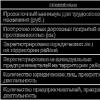40 hospital surgical department. Department of Digestive Surgery
She began her work in 1898. In 1988, by order of the city health department medical institution was converted into an oncology hospital to provide specialized inpatient and outpatient care.
The reception department was organized as a sanitary checkpoint, which was located in 3 rooms of the old building. Subsequently, due to the development of the hospital, the department moved to the cardiology building, where the operating room, dressing room, manipulation room, two examination rooms, two patient registration rooms, a clothing warehouse, offices, two bathrooms and auxiliary rooms are located. Today, the health care of Moscow has significantly improved the equipment of the department: there are three devices for recording ECG, a fibrogastroduodenoscope, a thermostat, a refrigerator for blood plasma, two computers for registering patients and other equipment. The hospital registers patients referred for treatment, conducts a medical examination and diagnosis of urgent patients using laboratory and instrumental techniques, provides emergency care and carries out resuscitation measures, complete or partial sanitization of patients, draws up accounting medical documentation.
Department of Digestive Surgery
40 has a Department of Surgery of the Digestive Organs and Endocrinology with 40 beds for the treatment of gastrointestinal bleeding. In 1931, the Department of General Surgery was established. Since 1964, a number of new surgical services have been dissociated. In 1988, further profiling of the surgical service of the hospital was carried out, the department of surgery of the digestive organs and endocrinology was created, on the basis of which in 1995 a center for gastrointestinal bleeding was opened. The department conducts modern diagnostics and surgical interventions for diseases of the stomach, duodenum(DPC), while giving priority to organ-preserving techniques, as well as diseases of the liver and extrahepatic bile ducts, pancreas and thyroid gland, intestines.
40 hospital, Moscow. Neurological Department
The department is an independent structural unit for the provision of highly qualified specialized medical care where patients with severe neurological pathology are located. The department employs 10 neurologists, 15 nurses, most of them have the first and highest qualification categories. Since 2000, a separate intensive care unit with 6 beds has been operating with round-the-clock medical and nursing supervision of patients. The department treats patients with vascular, infectious, demyelinating diseases nervous system, hereditary degenerative diseases, functional disorders nervous system and vegetovascular dystonia.
Emergency Outreach Service

The Emergency Outreach Medical Assistance Service has existed since the founding of the hospital. At first it was the air ambulance department, which was located in the health department. Calls were serviced by freelance medical consultants using specially equipped Yak-2A and AN-2 ambulance aircraft, with the help of which patients were quickly delivered to city clinical clinics. In 1963, the department was transferred to the GKB 40 base (Moscow). Soon the department was renamed the department of emergency and planned advisory medical care with the simultaneous expansion of its functional powers, that is, in addition to emergency assistance specialists provide on-site planned advisory medical care to the entire medical and preventive network of the city.
Department of Pulmonology and Thoracic Surgery
The Center for Pulmonology and Thoracic Surgery has 60 beds: 30 pulmonological, 25 thoracic, 5 allergological. Render specialized assistance patients with a thoracic profile began in 1954 (thoracoplasty, lung resection, transthoracic resection of the cardia). In 1963 it was opened with 30 beds. In 1976, the department expanded to 60 beds, it treated adults and children with thoracic pathology and therapeutic adults with diseases of the bronchological system. In 1972, 40 (Moscow) organized a bronchological service in the department, and in 1996 the department of pulmonology and thoracic surgery was opened, which became the city's medical diagnostic and consultative and methodological center for respiratory pathologies. The department employs 12 doctors, of which: 5 - the highest, 2 - the first, 3 - the second category.
Uronephrological department
The uronephrological department has 55 beds: 35 - urological, 20 - nephrological. In 1955, 5 urological beds were deployed on the basis of the surgical department of the hospital. In 1963, the hospital had 40 beds, and in 1976, the uronephrological center could already accept 60 patients. In the center, diagnostics and treatment of patients with urological and nephrological profiles are carried out at the modern level. Here they treat inflammatory diseases of the genitourinary system: anomalies in the development of the kidneys, Bladder, male genital organs, oncological diseases, urolithiasis, glomerulonephritis (both acute and chronic forms).
Orthopedotraumatology department

In 1959, 10 places were registered in the 1st City Clinical Hospital (Moscow). Working under the direct patronage of the city health department, the hospital administration, doctors are steadily introducing new treatment and diagnostic methods into the practice of treatment, which today are performed at the level scientific institutes and departments. The focus is on providing qualified assistance to the population, solving such problems as reducing mortality due to injuries, reducing disability from injuries and diseases of the musculoskeletal system. The employees of the department are also engaged in the training of orthopedic specialists, who will eventually go to work in all clinical hospitals in Moscow.
Pathology Department
40 the hospital has a pathoanatomical department, which was established in the 60s. In those years, about 2 thousand studies of biopsy and surgical material, 120 natanatomic autopsies were carried out, while the department was then assigned to the hospital. In 1970, a children's pathoanatomical department was created, which was attached to the maternity hospital and the city children's hospital.
40 hospital, Moscow. Hematology department

This department began its activities in 1961 on the basis of the city blood transfusion station. At first it had only 20 beds, then the number of beds was increased to 40. In 1976, the hematology department was transferred to the base of the hospital. It is as part of the hospital that it functions to this day, providing specialized care to patients with pathologies of the blood and blood-forming organs. The department employs 5 hematologists trained at the modern level in hematology, including 3 specialists of the highest category, 2 - the second.
Center for Functional Diagnostics and X-Ray Diagnostics

40 hospital accepts patients in the department of functional diagnostics. It opened on the basis of the institution in 1963. By that time, 3 radiologists and 4 X-ray laboratory assistants worked there. Today 26 people work: 6 radiologists and 15 radiologists.
During the period of formation, a significant number of methods were introduced that allow the clinician to conduct an objective diagnosis of the disease and evaluate functional state organs and systems of the patient's body. The institution is constantly improving existing and introducing new diagnostic methods in accordance with the needs of the clinical departments of the hospital. At present, the department is an integral structural subdivision of the institution with significant intellectual and diagnostic potential, which provides for the needs of all clinical departments of the hospital and the advisory polyclinic for diagnostic examinations.
Cardiology Department

In the first years of work, the department provided assistance to cardiological, rheumatological patients and patients with complex disorders. heart rate. Later, a rheumatology department was opened, and in 1996, a department for complex cardiac arrhythmias. Now there are 5 doctors: three of the highest category and two of the first category. A large staff of middle and junior medical workers. More than 1300 patients are treated in the department annually.
Also, the 40th hospital has a department of cardiovascular surgery with 30 beds: 20 for vascular and 10 for cardiac surgery. Today, it employs six cardiovascular surgeons, a cardiologist and a functional diagnostics doctor, who constantly maintain a high level of training in Russian clinics.
Gastroenterology department
40 hospital has a gastroenterology department. In 1997, given the presence of a surgery department in the hospital gastrointestinal tract, a center for the provision of surgical care to patients with gastrointestinal bleeding, a center for the treatment of pancreatitis, a center for the rehabilitation of patients with a gastroenterological group with 35 beds was organized on the basis of the gastroenterological department.
All patients who require medical care, qualified consultation, accurate diagnosis are always waiting for the city clinical Hospital 40 (GKB, Moscow). Its official website will give more detailed information.
The address
Main base: st. Kasatkina, d. 7.
Polyclinic: st. Malahitovaya, 18.
st. Taimyrskaya, d. 6.
Chief Physician: Fatuev Oleg Eduardovich
On the territory of modern Moscow there are many municipal institutions where its residents can receive qualified medical assistance. In the sphere of public services, one of the most important are city hospitals, which provide free assistance to attached Muscovites in all areas of modern medical practice. These complexes operate under the compulsory medical insurance program; in many of them, however, paid receptions are also held.
In the list of the largest medical institutions of the city, one of the first places is occupied by the City Clinical Hospital No. 40, located on Kasatkina Street. This hospital is also one of the oldest medical institutions in the capital - it began its work in 1898. Initially, the City Clinical Hospital No. 40 had only 4 beds, however, it quickly expanded and already in 1941 had 200 beds. In the same year, a feldsher-obstetric school was opened on the basis of the clinic, later reorganized into a medical school.
The modern City Clinical Hospital No. 40 in Moscow, whose official website is easy to find on the Internet, is a multidisciplinary healthcare institution with a total capacity of 1045 beds, which includes a separate clinic, polyclinic and maternity hospital. On the basis of the City Clinical Hospital No. 40 in Moscow, there are many departments located in the largest metropolitan institutes; active scientific activity is carried out, the latest methods of diagnostics and use of patients are studied, ways of their most productive application in practice are considered.
City Clinical Hospital No. 40, whose official website provides detailed information about it, provides not only planned, but also emergency medical care. The hospital provides free medical and diagnostic assistance to attached residents, subject to availability compulsory medical insurance policy; here you can also use additional paid services. One of the features of this institution is the presence of its own blood transfusion station.
The staff of City Clinical Hospital No. 40, reviews of which can be found on the Internet, employs doctors with extensive experience, who have the title of candidate and doctor of medical sciences; most of them are awarded the highest category. The institution is equipped with high-tech equipment that allows for the treatment of patients and their diagnosis at the very high level.
City Clinical Hospital No. 40 in Moscow: departments
As part of the clinic, there are many specialized departments, each of which provides services in a specific area. The structure of City Clinical Hospital No. 40 in Moscow includes:
Consulting department;
- department of diagnostics;
- surgical services;
- therapeutic services;
- resuscitation services;
- paraclinical departments.
The most voluminous subdivision is the therapeutic service. The complex of this substructure includes departments of therapy, neurology, cardiology, chemotherapy, radiology and others. The hospital also includes a department of transfusiology, functional, radiation and fluorescence diagnostics, as well as an X-ray and ultrasound room. Oncological and gynecological departments operate on the basis of City Clinical Hospital No. 40 in Moscow.
Those wishing to learn more about the work of City Clinical Hospital No. 40 can visit her personal website. On this portal you can find information about the history of the hospital, about its departments, about the procedure for providing services, about prices for additional services and much more.
City Clinical Hospital No. 40 in Moscow is a hospital worthy of respect!
Conditions
Good, by my standards, physical condition: double-glazed windows, spacious, comfortable beds, each bedside table, chair. Yes, there are 2 outlets per room, but all six of them had enough to charge a mobile phone and a razor. Who is traveling with a laptop, a radio - it is better to grab an extension cord. Wash everything and quite often.
Linen is changed if it gets dirty, at the request immediately without a limit. There is a shower - but you cannot use it in surgery with unhealed sutures. I went just before the operation - everything works. And so - the sink in the ward. Toilet on the floor.
At the time of the operation, valuables - a wedding ring, a wallet, a mobile phone were accepted for storage according to the inventory. Outerwear, also according to the inventory from the first day until discharge, is stored in a special storage. There are changing rooms in the reception area. The sick leave was issued without reminders and correctly.
Boilers are prohibited, but there is a water boiler on the floor, although it says "only for drinking medicines." On the floor there are two halls with TVs, in the men's and women's rooms.
snout. In the men's wing there were two new clean refrigerators for everyone. Food allowed according to the list can be brought with you without restriction.
They are fed steamed and unleavened, but fresh, hot and quite edible. In addition to oranges and kefir, I did not add anything to the hospital diet.
The general conclusion from the point of view of everyday life is that you can come on your own feet or arrive in an ambulance - and leave healthy on your own feet, even if there is no one to visit you.
But that's not the point.
Treatment
They treat quite effectively, after the abdominal operation I was discharged on the 7th day - the seam has grown together. The next he went to work (he wanted to). It's been 10 days since I was discharged and I haven't noticed any problems. It hurts, but less.
If they are treated with antibiotics, then they are serious, but they don’t give bifidum - the cause of constipation (this is for the Ministry of Health - it is not included in the MHI). Well, it’s not expensive to buy your own, and the doctor will tell you how and when to drink. All prescribed drugs are missing.
Examinations: tests, a cardiogram were done quickly and professionally, the mistakes of the district polyclinic were corrected - the blood type (I ended up in the hospital, as in my whole life - the second, and in the district - for some reason the first). With the cardiogram, they also reassured me that my heart was fine. They said that in the district clinic, again, something was measured wrong.
The operating room looks impressive, there is a lot of huge equipment - everything looks modern.
The surgeon Alexander Valeryevich operated on me - I don’t know from God or not (I’m not a believer), but a fully good specialist - you can trust. When I was discharged, only 4 more people operated on by him were discharged from our ward, everyone was eager to work as soon as possible, they felt quite healthy.
All procedures are done according to the schedule: dressings, injections, droppers, enemas, blood sampling - everything is on their floor in three minutes. For sedentary patients, they bring to the floor and what is more complicated - I saw the cardiogram myself.
medical staff
The sisters are different - some are cheerful, some are silent, but everyone is always in place, all that he asked was to measure the pressure at the wrong time at night - they do everything, they don’t take money (offered). At night, there are two sisters on the floor - male and female. I saw how they carried a lost old man on a wheelchair to his bed - they do not sleep, they work.
Doctors regularly make rounds, listen in detail and examine everyone, they are quite correct. Stupid questions are also answered quite restrainedly. On weekends there is a doctor on duty and manages to get around everyone. On weekdays, twice a week, I made rounds with some bosses: there were five doctors. Everything was checked again. The attending physician spoke in the form of a report on each patient - it is clear that they are watching.
The whole hospital.
Since I was a walker, I quietly walked around the entire hospital, appearance everything, like ours, in surgery, is no worse. In any hospital there is not a resort, but in itself - hospital No. 40 in Moscow is quite good.
Likhachev Sergey



















